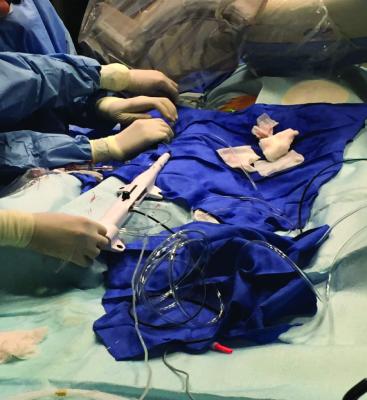
November 13, 2017 — The Society for Cardiovascular Angiography and Interventions recently announced the launch of TRAnsition for VALUE, a multi-faceted educational initiative supported by Medtronic, to inform cardiologists, hospital administrators and cath lab staff about the benefits of expanding the adoption of transradial (wrist access) percutaneous coronary intervention (PCI) in the U.S.
Approximately 70 percent of PCI procedures in the U.S. are performed through transfemoral (groin area) access. While this approach is often successful, it is associated with challenges, including an increased risk of bleeding complications at the insertion site and a slower recovery process for the patient.
As the country’s healthcare system moves toward a value-based approach, TRAnsition for VALUE highlights the clinical and economic advantages of transradial intervention, which has increased from 16 to nearly 30 percent in the past decade. While not all patients can benefit from this approach, eligible patients may experience improved safety with reductions in major bleeding and vascular complications, increased comfort, a shorter hospital stay and lower risk of mortality.
Despite the potential benefits, usage rates among U.S. interventionalists remain lower than those in similar healthcare systems, with cardiologists in major European and Asian countries reporting transradial usage at over 70 percent. Research indicates that a lack of education and training has impacted U.S. transradial adoption rates.
“Value for your healthcare dollar is an increasingly important driving force in the current healthcare environment. It is demanded by patients, payers and regulators,” said Adhir Shroff, M.D., MPH, FSCAI, chair of TRAnsition for VALUE, and director, cardiovascular catheterization laboratories, University of Illinois. “The transradial approach represents an opportunity to provide value-based healthcare through improving outcomes for patients and streamlining care delivery within medical centers.”
In addition, the transradial approach increases hospital efficiency by allowing same-day discharge, reducing recovery time and hospital staffing needs, and decreasing the cost of care. It also may expand treatment options for those who may not be candidates for transfemoral access PCI, such as those who are obese, elderly or have orthopedic disabilities that make it difficult to lie flat.
“Transradial PCI is truly a patient-centric approach with undisputed clinical benefits and patient preference,” said Sunil V. Rao, M.D., FSCAI, associate professor of medicine, Duke University Medical Center, and co-chair of the initiative. “The issue has been a lack of training opportunities for physicians interested in adopting this approach. SCAI’s comprehensive TRAnsition for VALUE program offers the resources, training and opportunity to learn from the nation’s experts.”
The TRAnsition for VALUE education curriculum will be guided by the SCAI Quality Improvement Committee and supports SCAI’s consensus statement on transradial best practices. The primary education destination is a new website, TRAnsitionForVALUE.org, where visitors can register to receive custom education and training opportunities. The site will also host a modular, eight-part, quality improvement toolkit with accompanying webinars hosted by SCAI Quality Improvement experts on the following topics:
- How Value-Based Healthcare Affects Your Clinical Practice;
- The Clinical Benefits of Transradial Access;
- The Economic Benefits of Transradial Access;
- Femoral to Radial 101 – Where to Begin for MDs;
- Clinical Best Practices, Tips & Tricks for TRA Technique;
- Rethinking Care Delivery in a TRA Cath Lab;
- The Cath Lab Staff’s Role in TRA Adoption; and
- Your TRA Support Network: How to Initiate Change
The TRAnsition for VALUE program will also be featured at the annual SCAI Scientific Sessions, as well as other regional events in partnership with hospitals and healthcare systems throughout the U.S.
Watch the VIDEO Update on U.S. Transradial Access Adoption With Sunil Rao at TCT 2015
Read "Radial Access, Same-Day Cardiac Procedure Could Save $300 Million Annually"
For more information: www.transitionforvalue.org


 November 14, 2025
November 14, 2025 









